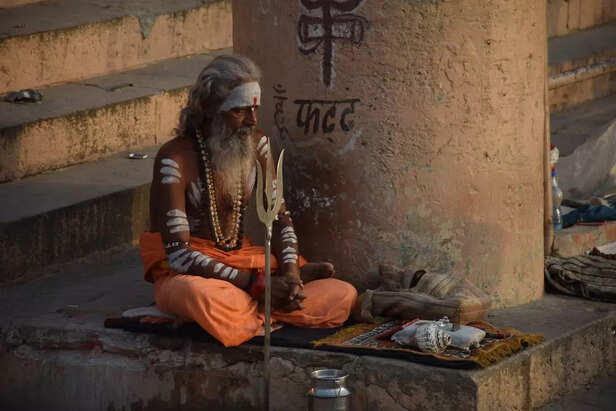If Karma is Real, Why Do Good People Suffer? The Gita Challenges What We Believe
Nidhi | Feb 25, 2025, 23:14 IST
Krishna and Arjuna
( Image credit : Times Life Bureau )
If karma is real, why do good people suffer while the unjust seem to thrive? The Bhagavad Gita challenges our understanding of justice, revealing that suffering is not punishment but a path to spiritual evolution. This article unpacks the deeper truths of karma, reincarnation, and the soul’s journey, offering a perspective that shifts how we view pain, destiny, and divine justice.
अवश्याया भवितु द्विजेनि यात्या दुष्टरमवाप्निभावस्थिताः ।
avashyayan bhavitam dvijanih yathā dustaramavāp nibhaavasthitāṁ
("That which is bound to happen, O learned one, will surely take place; none can prevent it.")
It’s an age-old question that haunts even the strongest believers: If karma is real, why do good people suffer while the unjust thrive? Shouldn’t goodness be rewarded and wrongdoing punished?
The Bhagavad Gita offers an answer that goes beyond simplistic ideas of justice. It does not promise instant results but reveals a deeper truth: karma is far more intricate than mere cause and effect. It operates beyond a single lifetime, shaping the soul’s eternal journey.
Let’s explore how the Gita unravels this profound mystery.
 Most people assume karma is like a simple transaction: do good, receive good. But Krishna explains that karma functions across multiple lifetimes. The suffering one endures today could be the result of actions from a previous birth, just as today’s good deeds may bloom in another life.
Most people assume karma is like a simple transaction: do good, receive good. But Krishna explains that karma functions across multiple lifetimes. The suffering one endures today could be the result of actions from a previous birth, just as today’s good deeds may bloom in another life.
शरीरं यदवाप्नोति यच्चाप्युत्क्रामतीश्वरः |
गृहीत्वैतानि संयाति वायुर्गन्धानिवाशयात् ||
(“Just as the wind carries fragrances from flowers, so does the soul carry karma from one body to another.”) — Bhagavad Gita 15.8
A person who seems virtuous yet faces hardship may be exhausting past-life karma. Meanwhile, someone who appears to be thriving despite wrongdoing is merely reaping the results of past good karma—but will eventually face the consequences of their current actions.
2. Suffering is Not Punishment, It’s Spiritual Refinement
 मात्रास्पर्शास्तु कौन्तेय शीतोष्णसुखदुःखदाः |
मात्रास्पर्शास्तु कौन्तेय शीतोष्णसुखदुःखदाः |
आगमापायिनोऽनित्यास्तांस्तितिक्षस्व भारत ||
(“O Arjuna, pleasures and pains come and go like the seasons; endure them patiently, for they are temporary.”) — Bhagavad Gita 2.14
Gold must be heated in intense fire to be purified. Similarly, the soul undergoes suffering not as a punishment but as a means of refinement. Pain breaks egoistic illusions, detaches us from material distractions, and accelerates our journey toward self-realization.
Those who endure suffering with wisdom are not victims of injustice but souls in the process of spiritual evolution.
In today’s world, success is measured in money, status, and recognition. But the Gita redefines true wealth as inner strength.
 A person who chooses kindness in adversity, patience in suffering, and righteousness despite challenges builds a powerful soul. While the immoral may temporarily prosper, their inner world remains chaotic. Krishna reminds us that good karma doesn’t always show in external riches—it reflects in peace, resilience, and an unwavering connection to the divine.
A person who chooses kindness in adversity, patience in suffering, and righteousness despite challenges builds a powerful soul. While the immoral may temporarily prosper, their inner world remains chaotic. Krishna reminds us that good karma doesn’t always show in external riches—it reflects in peace, resilience, and an unwavering connection to the divine.
Suffering often feels unjust because we believe we control our fate. But Krishna reveals that while we have free will, we are not the ultimate doers—there is a divine flow at play.

प्रकृतेः क्रियमाणानि गुणैः कर्माणि सर्वशः |
अहङ्कारविमूढात्मा कर्ताहमिति मन्यते ||
(“All actions are performed by material nature’s modes; the egoistic fool believes ‘I am the doer.’”) — Bhagavad Gita 3.27
The ego resists suffering because it craves immediate justice. The soul, however, understands that divine justice operates beyond human perception.
 Karma is not fatalistic. Krishna reassures that while past actions shape the present, the future is still in our hands. Every conscious choice we make—choosing truth over deceit, love over hatred—alters our karmic path.
Karma is not fatalistic. Krishna reassures that while past actions shape the present, the future is still in our hands. Every conscious choice we make—choosing truth over deceit, love over hatred—alters our karmic path.
This means suffering is not a sentence but a crossroads. We can react with bitterness or use hardships as a stepping stone to evolve spiritually.
Instead of asking “Why me?”, Krishna encourages us to ask, “What is this teaching me?”

Many enlightened beings endured immense suffering before their awakening. Pain forces deep self-reflection, breaking illusions and strengthening the soul. Often, what seems like misfortune is a disguised blessing leading to higher consciousness.
When Arjuna hesitated to fight in the Mahabharata war, overwhelmed by grief, Krishna reminded him that abandoning duty due to personal sorrow is not wisdom—it’s weakness.

Similarly, in our struggles, we must continue fulfilling our responsibilities. Whether as a parent, student, or professional, suffering should not become an excuse to abandon our path. Instead, embracing hardships as part of our dharma makes them meaningful.
स्वधर्मे निधनं श्रेयः परधर्मो भयावहः ||
(“Better to die performing one’s own duty than to follow another’s path, which is full of fear.”) — Bhagavad Gita 3.35
8. Free Will and Karma Coexist—Our Choices Matter
Many assume karma means everything is predestined. Krishna refutes this. While past karma creates circumstances, how we respond is entirely within our control.

A person born into suffering can choose bitterness or wisdom. A person born into privilege can choose arrogance or humility. The future is shaped by present choices.
9. Attachment to Results is the Root of All Suffering
Krishna states that suffering intensifies when we obsess over results. The solution is nishkama karma—selfless action without attachment to success or failure.

कर्मण्येवाधिकारस्ते मा फलेषु कदाचन |
मा कर्मफलहेतुर्भूर्मा ते सङ्गोऽस्त्वकर्मणि ||
(“Your right is to perform your duty, not to expect results. Do not be attached to success or failure.”) — Bhagavad Gita 2.47
When we act without expecting rewards, we experience profound peace. Detachment from outcomes does not mean inaction—it means embracing life’s flow with trust.
The Bhagavad Gita does not promise worldly justice; it offers a greater reward—freedom from suffering itself.

Karma governs the material world, but the highest goal is moksha—liberation from the cycle of birth and rebirth. Those who suffer yet remain righteous are on the journey toward eternal peace, beyond fleeting joys and sorrows.
Rather than asking “Why do good people suffer?”, the Bhagavad Gita shifts the question: “How can suffering elevate me?”
True wisdom lies in seeing hardships not as punishments but as spiritual transformations. The soul’s journey spans lifetimes, and divine justice unfolds beyond human perception.
Once we stop seeking immediate fairness and embrace karma’s deeper purpose, suffering ceases to be a burden. It becomes a sacred teacher guiding us toward truth, inner peace, and liberation.
avashyayan bhavitam dvijanih yathā dustaramavāp nibhaavasthitāṁ
("That which is bound to happen, O learned one, will surely take place; none can prevent it.")
It’s an age-old question that haunts even the strongest believers: If karma is real, why do good people suffer while the unjust thrive? Shouldn’t goodness be rewarded and wrongdoing punished?
The Bhagavad Gita offers an answer that goes beyond simplistic ideas of justice. It does not promise instant results but reveals a deeper truth: karma is far more intricate than mere cause and effect. It operates beyond a single lifetime, shaping the soul’s eternal journey.
Let’s explore how the Gita unravels this profound mystery.
1. Karma is a Multi-Lifetime Journey, Not a One-Time Deal

Karma: Krishna
( Image credit : Times Life Bureau )
शरीरं यदवाप्नोति यच्चाप्युत्क्रामतीश्वरः |
गृहीत्वैतानि संयाति वायुर्गन्धानिवाशयात् ||
(“Just as the wind carries fragrances from flowers, so does the soul carry karma from one body to another.”) — Bhagavad Gita 15.8
A person who seems virtuous yet faces hardship may be exhausting past-life karma. Meanwhile, someone who appears to be thriving despite wrongdoing is merely reaping the results of past good karma—but will eventually face the consequences of their current actions.
2. Suffering is Not Punishment, It’s Spiritual Refinement

Suffering
( Image credit : Pexels )
आगमापायिनोऽनित्यास्तांस्तितिक्षस्व भारत ||
(“O Arjuna, pleasures and pains come and go like the seasons; endure them patiently, for they are temporary.”) — Bhagavad Gita 2.14
Gold must be heated in intense fire to be purified. Similarly, the soul undergoes suffering not as a punishment but as a means of refinement. Pain breaks egoistic illusions, detaches us from material distractions, and accelerates our journey toward self-realization.
Those who endure suffering with wisdom are not victims of injustice but souls in the process of spiritual evolution.
3. Good Actions Strengthen the Soul, Not Always Materially Rewarded

Peaceful Living
4. The Illusion of Control: The Ego Rebels, The Soul Surrenders

Nothing is Yours
( Image credit : Pexels )
प्रकृतेः क्रियमाणानि गुणैः कर्माणि सर्वशः |
अहङ्कारविमूढात्मा कर्ताहमिति मन्यते ||
(“All actions are performed by material nature’s modes; the egoistic fool believes ‘I am the doer.’”) — Bhagavad Gita 3.27
The ego resists suffering because it craves immediate justice. The soul, however, understands that divine justice operates beyond human perception.
5. Present Pain is the Result of Past Actions, But the Future Can Be Changed

Trust the Process
This means suffering is not a sentence but a crossroads. We can react with bitterness or use hardships as a stepping stone to evolve spiritually.
6. Adversity Leads to the Greatest Awakening

Detach Yourself
( Image credit : Pexels )
Many enlightened beings endured immense suffering before their awakening. Pain forces deep self-reflection, breaking illusions and strengthening the soul. Often, what seems like misfortune is a disguised blessing leading to higher consciousness.
7. Dharma Over Despair: Fulfill Your Duty Despite Hardship

You've Responsibilities to Look Over
( Image credit : Freepik )
Similarly, in our struggles, we must continue fulfilling our responsibilities. Whether as a parent, student, or professional, suffering should not become an excuse to abandon our path. Instead, embracing hardships as part of our dharma makes them meaningful.
स्वधर्मे निधनं श्रेयः परधर्मो भयावहः ||
(“Better to die performing one’s own duty than to follow another’s path, which is full of fear.”) — Bhagavad Gita 3.35
8. Free Will and Karma Coexist—Our Choices Matter

Bonds That Matter
( Image credit : Pexels )
A person born into suffering can choose bitterness or wisdom. A person born into privilege can choose arrogance or humility. The future is shaped by present choices.
9. Attachment to Results is the Root of All Suffering

Free Yourself from Pain
( Image credit : Pexels )
कर्मण्येवाधिकारस्ते मा फलेषु कदाचन |
मा कर्मफलहेतुर्भूर्मा ते सङ्गोऽस्त्वकर्मणि ||
(“Your right is to perform your duty, not to expect results. Do not be attached to success or failure.”) — Bhagavad Gita 2.47
When we act without expecting rewards, we experience profound peace. Detachment from outcomes does not mean inaction—it means embracing life’s flow with trust.
10. The Ultimate Justice is Liberation, Not Temporary Rewards

Moksha
( Image credit : Pexels )
Karma governs the material world, but the highest goal is moksha—liberation from the cycle of birth and rebirth. Those who suffer yet remain righteous are on the journey toward eternal peace, beyond fleeting joys and sorrows.
The Gita’s Profound Answer to Suffering
True wisdom lies in seeing hardships not as punishments but as spiritual transformations. The soul’s journey spans lifetimes, and divine justice unfolds beyond human perception.
Once we stop seeking immediate fairness and embrace karma’s deeper purpose, suffering ceases to be a burden. It becomes a sacred teacher guiding us toward truth, inner peace, and liberation.
